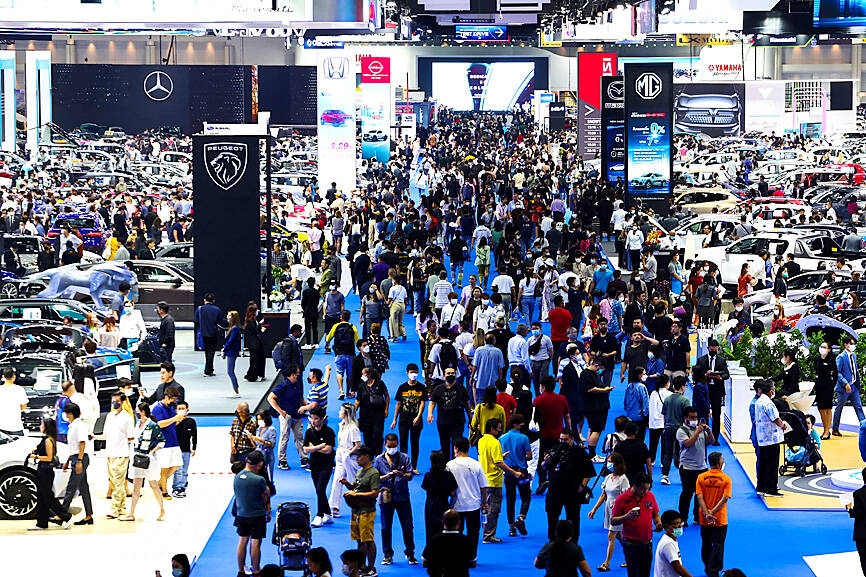Global PMX Co (智伸科), which provides mechanical parts for the automotive, electronics, sports and medical sectors, has proposed its highest cash dividend in five years after the company reported record profit last year.
Its board of directors yesterday proposed a cash dividend of NT$6 per share based on earnings per share of NT$12.2 last year, the highest in the company’s history.
The dividend — higher than the previous year’s NT$5 per share and the highest since 2018 when the company paid NT$6.35 to shareholders — would represent a payout ratio of 49.18 percent.

Photo: Reuters
It also translates into a dividend yield of 4.01 percent after the company’s shares closed at NT$149.5 in Taipei trading yesterday.
If shareholders approve the proposal at the company’s annual general meeting on June 20, it would distribute a total of NT$691.33 million (US$22.76 million) in cash dividends.
Global PMX boosted its dividend payout based on record revenue and profit last year as robust performance in the medical segment offset slowing sales in its automotive and electronics businesses, while foreign-exchange gains also contributed NT$177 million in nonoperating income, the company said in a statement.
The company’s products include anti-lock braking, electronic stability control, gasoline direct-injection and dual-clutch transmission systems, as well as high-pressure pumps. It also produces components for surgical equipment, and parts used in electronics and sports devices.
Consolidated revenue last year increased 4.78 percent from a year earlier to NT$9.24 billion, while net profit rose 16.89 percent to NT$1.41 billion from NT$1.2 billion in 2021, the company said.
Sales from the automotive segment accounted for 51.77 percent of the company’s revenue last year, while the sports, electronics and medical segments contributed 17.26, 12.85 and 13.63 percent respectively, it said.
Global PMX said that sales from its medical business soared 97.86 percent from the previous year due to its joint research-and-development efforts with customers, which saw the company start shipments of new products related to minimally invasive surgeries later last year, it added.
The company’s gross margin last year decreased by 0.49 percentage points to 27.12 percent, but operating margin grew by 0.04 percentage points to 17.65 percent thanks to a better product mix, improved production yield and stricter cost controls, Global PMX said.
It said it is cautiously positive about its sales performance in the first half of this year, given the improved supply of auto chips and the global vehicle market’s recovery from the COVID-19 pandemic, as well as the increasing penetration of new energy vehicles in China.
With anticipated improvements in the automotive and medical segments, capacity utilization at the company’s plants in China is expected to increase, driving operations to grow steadily, it said.

United Microelectronics Corp (UMC, 聯電) expects its addressable market to grow by a low single-digit percentage this year, lower than the overall foundry industry’s 15 percent expansion and the global semiconductor industry’s 10 percent growth, the contract chipmaker said yesterday after reporting the worst profit in four-and-a-half years in the fourth quarter of last year. Growth would be fueled by demand for artificial intelligence (AI) servers, a moderate recovery in consumer electronics and an increase in semiconductor content, UMC said. “UMC’s goal is to outgrow our addressable market while maintaining our structural profitability,” UMC copresident Jason Wang (王石) told an online earnings

Gudeng Precision Industrial Co (家登精密), the sole extreme ultraviolet (EUV) pod supplier to Taiwan Semiconductor Manufacturing Co (TSMC, 台積電), is aiming to expand revenue to NT$10 billion (US$304.8 million) this year, as it expects the artificial intelligence (AI) boom to drive demand for wafer delivery pods and pods used in advanced packaging technology. That suggests the firm’s revenue could grow as much as 53 percent this year, after it posted a 28.91 percent increase to NT$6.55 billion last year, exceeding its 20 percent growth target. “We usually set an aggressive target internally to drive further growth. This year, our target is to

The TAIEX ended the Year of the Dragon yesterday up about 30 percent, led by contract chipmaker Taiwan Semiconductor Manufacturing Co (TSMC, 台積電). The benchmark index closed up 225.40 points, or 0.97 percent, at 23,525.41 on the last trading session of the Year of the Dragon before the Lunar New Year holiday ushers in the Year of the Snake. During the Year of the Dragon, the TAIEX rose 5,429.34 points, the highest ever, while the 30 percent increase in the year was the second-highest behind only a 30.84 percent gain in the Year of the Rat from Jan. 25, 2020, to Feb.

Cryptocurrencies gave a lukewarm reception to US President Donald Trump’s first policy moves on digital assets, notching small gains after he commissioned a report on regulation and a crypto reserve. Bitcoin has been broadly steady since Trump took office on Monday and was trading at about US$105,000 yesterday as some of the euphoria around a hoped-for revolution in cryptocurrency regulation ebbed. Smaller cryptocurrency ether has likewise had a fairly steady week, although was up 5 percent in the Asia day to US$3,420. Bitcoin had been one of the most spectacular “Trump trades” in financial markets, gaining 50 percent to break above US$100,000 and